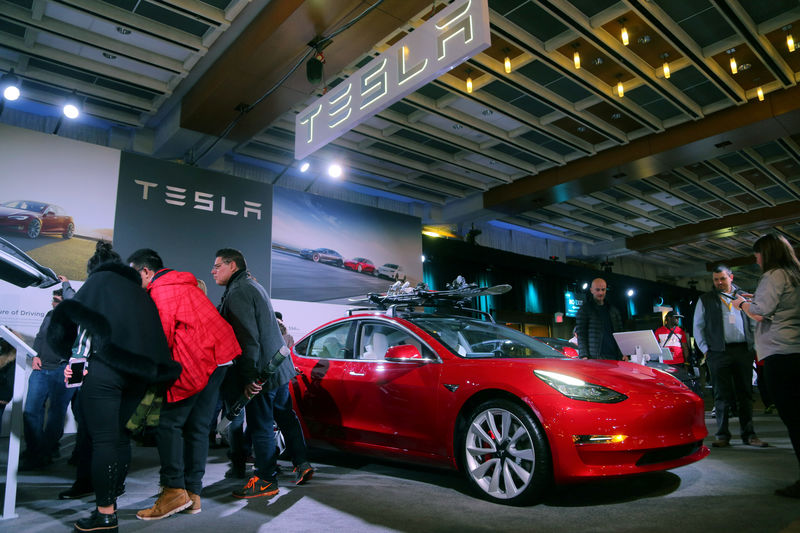By David Shepardson
WASHINGTON (Reuters) - The Trump administration is expanding efforts to block the use of Chinese technology in advanced vehicles, denying additional requests by Tesla (NASDAQ:TSLA) Inc for tariff relief on key components of its electric vehicles, and rejecting ride-hailing company Uber's petition to waive tariffs on electric scooters and at least 50 separate requests by General Motors Co (NYSE:GM).
After the United States slapped 25 percent tariffs on $50 billion of Chinese imports last year under the two countries' trade dispute, the U.S. Trade Representative (USTR) allowed companies to petition for exemptions.
Government documents show the USTR rejected requests to exempt Tesla's Model 3 car computer and center screen in May 29 letters, saying they both concern "a product strategically important or related to 'Made in China 2025,' or other Chinese industrial programs."
In May, Reuters reported that USTR had rejected a separate request by Tesla to exempt the company's Autopilot "brain" from the tariffs.
The more than 50 requests by GM rejected by USTR were for exemptions from Chinese-made parts used in vehicles including electronic controllers used for high voltage battery controls in hybrid and electric vehicles. It also rejected GM requests for high frequency antennas, push-button ignition switches, battery cables, electric motor parts and brake parts.GM declined to comment. In filings it said that some parts were not available outside China or that it would be cost prohibitive to shift production elsewhere.
The USTR denied Uber Technologies (NYSE:UBER) Inc's request on May 29 for an exemption from the 25% tariff for its Chinese-made electric bikes that customers rent through its app. Uber declined to comment.
USTR also rejected dozens of requests by Nissan Motor Co. It denied nearly two dozen requests from Fiat Chrysler for parts including wire harnesses and an electrical power steering pump used in vehicles like the company's 2019 Ram 1500 and Jeep Wrangler.
Fiat Chrysler warned USTR in one request that without exemptions it will "reduce its margins, pass the additional cost onto consumers, or some combination of the two."
The denials of relief for more than 7,000 products to date out of 13,000 requests illustrate a systematic approach by the Trump administration to thwart China's efforts to develop high-technology industries that Washington alleges benefited from theft and forced transfer of U.S. intellectual property.
Tesla had warned that increased tariffs on the car computer it has dubbed the "brains" of the Model 3 causes "economic harm to Tesla, through the increase of costs and impact to profitability."
Tesla had also urged the office to approve a request by its supplier SAS Automotive USA Inc, builder of the touchscreen control screen for the Model 3, which displays navigation, media, audio and other functions.
Tesla did not immediately respond to a request for comment, but said in an April 29 securities filing that "costs for producing our vehicles in the U.S. have also been affected by import duties on certain components sourced from China."
Shares of Tesla were off earlier highs after Reuters first reported the decisions, but closed up 2.2% at $213.91 on the Nasdaq.
Tesla said in its tariff exemption request that "choosing any other supplier would have delayed the (Model 3) program by 18 months with clean room setup, line validation and staff training."
China's "Made in China 2025" strategy is focused on 10 strategic advanced manufacturing industries including new energy vehicles, where it aims to be a global leader.
Reuters reported previously that U.S. trade officials also rejected on May 29 separate requests from GM and Chinese-owned Volvo Cars for an exemption to the 25% U.S. tariff on their sport utility vehicles made in China.
Both GM and Volvo Cars, a unit of Geely, had not raised the sticker price to account for tariffs, which came into play last July.
GM's Buick Envision, a midsize SUV with a starting price of about $35,000, has become a target for U.S. critics of Chinese-made goods, including leaders of the United Auto Workers union and members in key political swing states such as Michigan and Ohio.

USTR has also rejected dozens of other requests by suppliers for major auto companies.